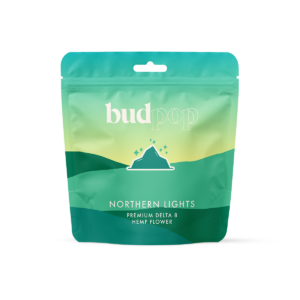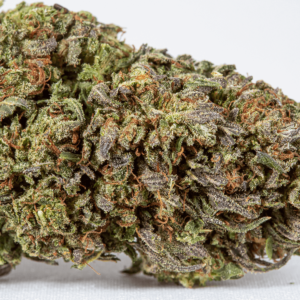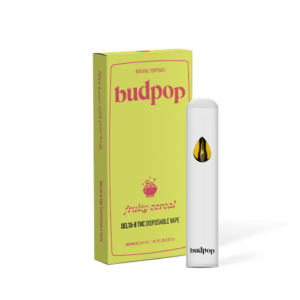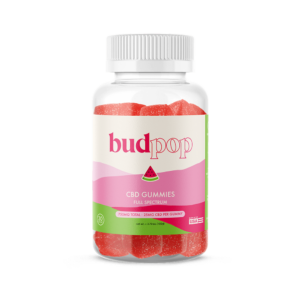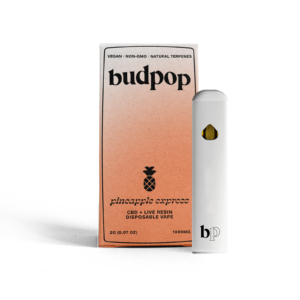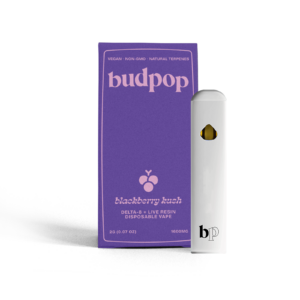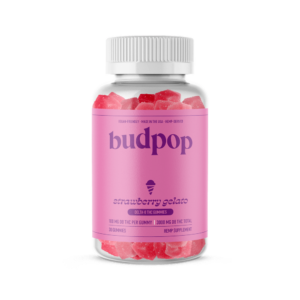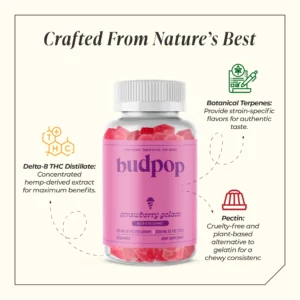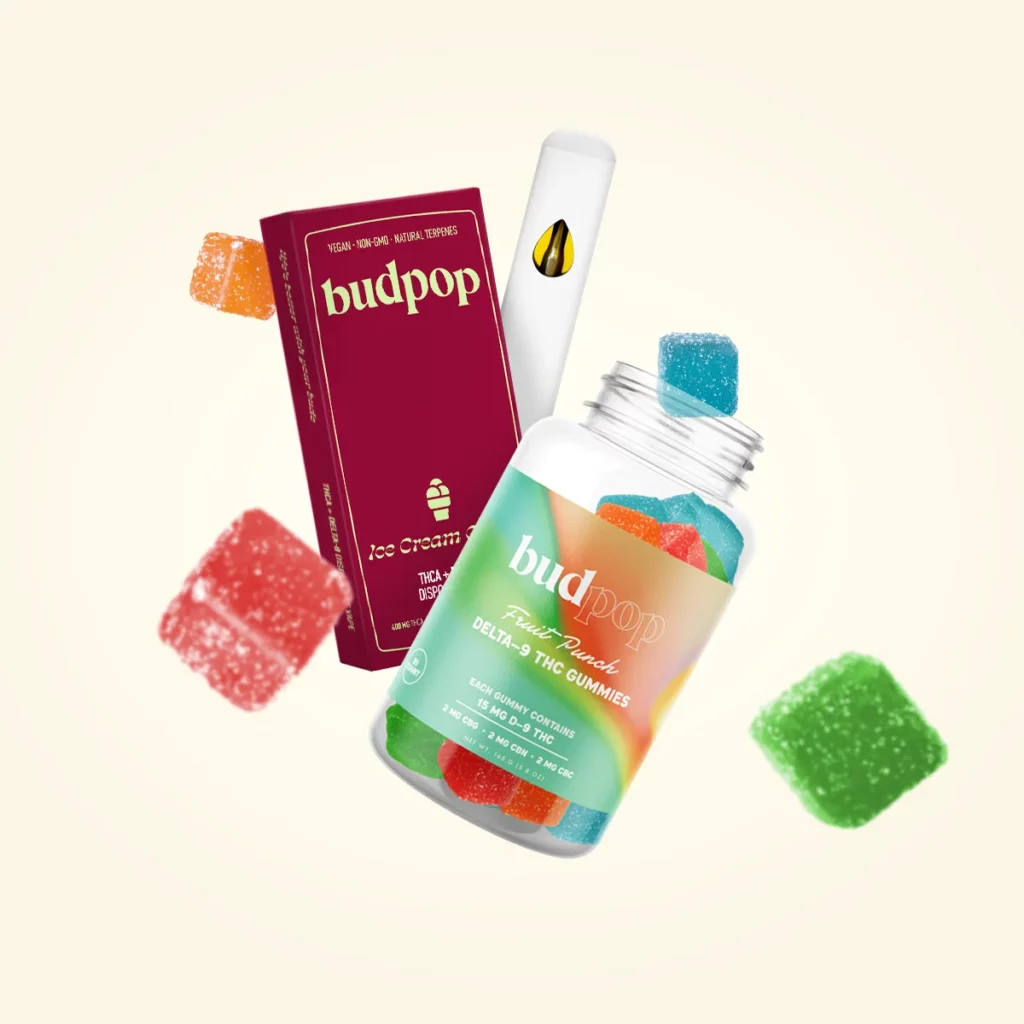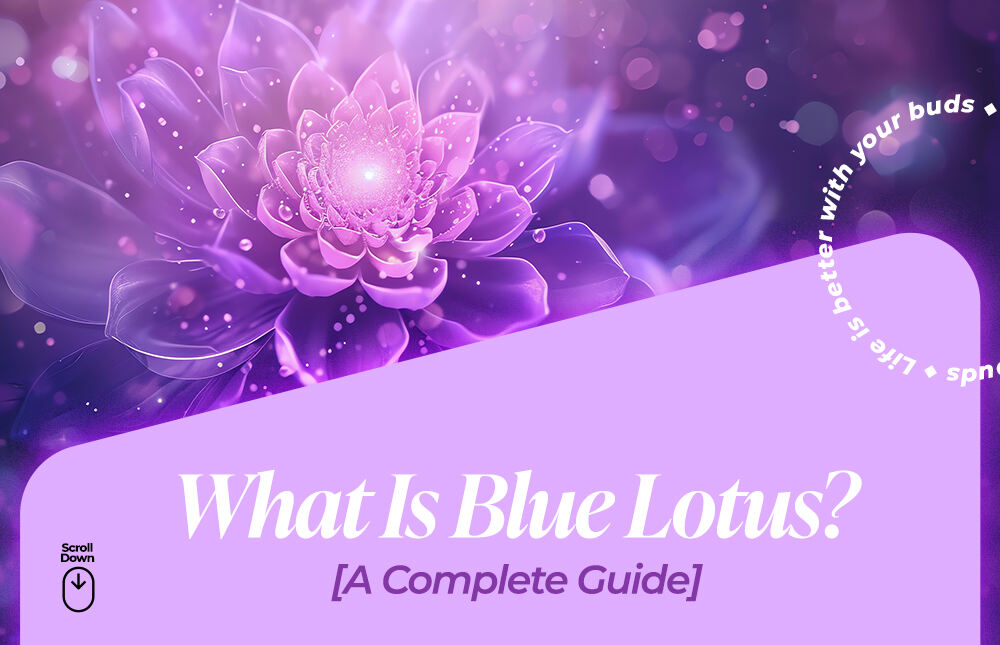
What Is Blue Lotus? [The Rich History, Benefits, Uses & More]
You might have seen or heard about the blue lotus flower lately. This ancient water lily has seen its popularity boom recently thanks to its stress-relieving and sleep-supporting potential. You might be wondering: what is blue lotus? Its calming properties, euphoric effects, and benefits for overall well-being date back to ancient times.
A staple of holistic wellness for ancient cultures, this sacred blue lily is currently experiencing a resurgence with modern audiences. Many use it in teas and smokables to enjoy its potential healing properties. So, what is blue lotus flower? Read on to learn the answer to the question and find out if it’s right for you.
Historical Background of the Egyptian Blue Lotus Flower
Blue lotus (Nymphaea caerulea), also known as Egyptian blue lotus, is a water lily originating from the banks of the Nile River in Egypt. It typically grows in shallow waters, such as ponds, lakes, and marshes. The blue lotus flower has beautiful blue-purple petals and a bright yellow center with thin pistils extending upwards. This aquatic plant soon became a popular remedy in ancient Egyptian culture.
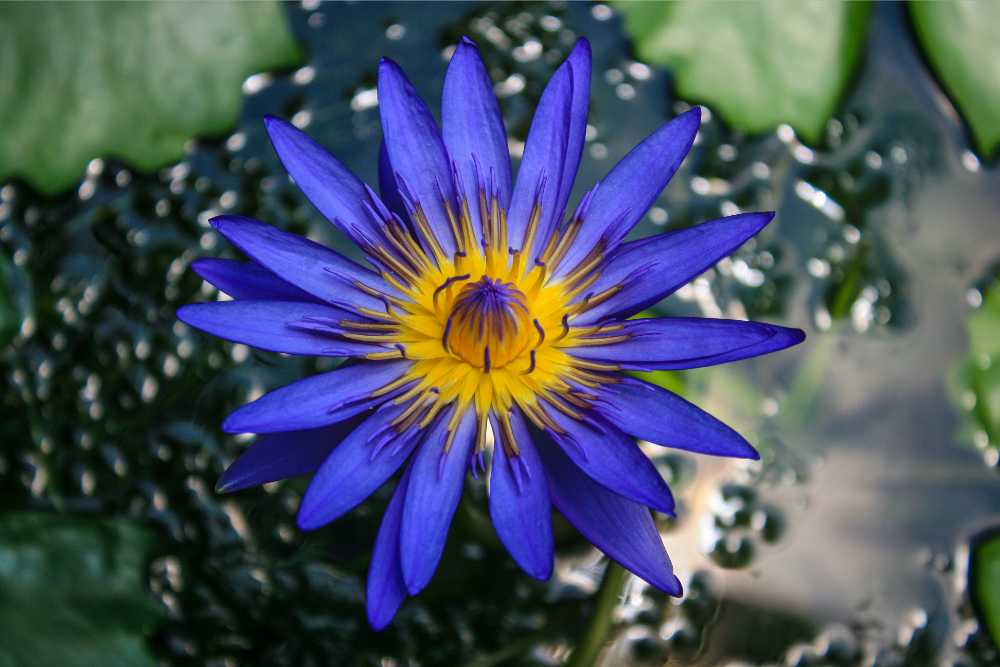
The flower’s ability to bloom in the Nile’s muddy waters symbolized a spiritual awakening. Egyptians believed blue lotus provided a valuable connection to the spiritual world. It became a big part of rituals and religious ceremonies. You can find depictions of blue lotus flowers in art from the time. Ancient Egyptians also used blue lotus for its purported healing properties, soothing abilities, and euphoric effects.
As time passed, the blue water lily soon gained popularity in various ancient cultures and migrated beyond its origins in Northern and Central Africa. It became a favorite among Egyptians as well as Hindu and Buddhist cultures of South and East Asia. Each culture used blue lotus flowers in various applications.
Ancient Egyptians
Ancient Egyptians were taken by the blue water lily’s blooming patterns. The blue lotus petals would open at the first sign of sunlight and close when the sun sets. Therefore, they saw the plant as a symbol of renewal and rebirth.
The Egyptians also associated the blue Egyptian lotus with the sun god Ra and Osiris, the god of the underground. They worshipped it in Egyptian art, artifacts, and hieroglyphics. It was also mentioned in the “Book of the Dead,” which recounts religious and spiritual rituals.
The blue water lily was also included in religious ceremonies and rituals. Its dreamy euphoria would take them to another realm of spirituality.
Buddhism and Hinduism
Buddhists and Hindus often meditated with the blue water lily. According to the Lotus Sutra, one of the most important texts in Mahayana Buddhism, the blue lotus would bloom everywhere the baby Buddha stepped. It signified wisdom, purity, and spirituality.
In Hinduism, the blue lotus became synonymous with various gods and goddesses. Ancient Indians often included the blue water lily in artwork for the God Vishnu, who represents preservation and protection. Blue lotus also became linked with Lakshmi, Sarasvati, Brahma, and other Hindu deities.

Benefits of Blue Lotus
Blue lotus may provide several physical and mental health benefits to consumers. Depending on how and for what reasons it is taken, blue lotus flowers may be the holistic solution many seek to deal with certain issues.
Here are some of the many potential blue lotus benefits.
Improves Well-Being
Blue lotus is often taken to support overall wellness. It is said to have relaxing effects. Blue lotus may also reduce stress and anxiousness and promote peaceful sleep. Its soothing, intoxicating fragrance makes it an effective meditation aid. Finally, blue lotus may help people uncover higher levels of mindfulness.
Therapeutic Potential
Western medicine does not recognize blue water lily as a cure for diseases. However, it is rich in flavonoids like myricetin, kaempferol, and quercetin, which have antioxidant properties. They protect the system from free radicals that make the body susceptible to disease.
Ancient Egyptians often used the flower to treat diarrhea, urinary issues, fever, and heart palpitations. This ancient holistic remedy requires further research to verify its therapeutic effects and potential side effects.
Dreams and Visions
People often use the blue water lily for its euphoric effects. They feel it helps them connect to a higher power and communicate with the spiritual world. Different people may have different experiences when using the sacred flower.
However, there is no proof that it serves as a spiritual gateway. But there’s only one way to find out, and that’s to give it a try.
But blue lotus does hold some potential, as it was used for thousands of years in various ceremonies. How these visions manifest for you is an entirely personal experience that can only be described by the person experiencing their effects.
Increases Libido
Ancient Egyptians and Mayans often used the blue water lily to help them become less inhibited in sexual encounters. They would drink blue lotus wine to achieve higher levels of sexual excitement.
A 2019 study backs the correlation between blue water lily and aphrodisiac effects. It contains nuciferine, which may boost circulation and help with erectile dysfunction (ED).

Active Compounds in Blue Lotus
Blue lotus may seem like hooey to people who don’t believe in herbal remedies. However, its active compounds have been shown to provide beneficial effects. Blue lotus contains the aporphine alkaloids nuciferine and apomorphine, which may yield the following results.
Apomorphine
- Increases Relaxation. Apomorphine is often used as an anesthetic. Its relaxing effects make it a suitable, peaceful sleep aid. It may reduce stress and anxiousness.
- Anti-Parkinson’s Drug. The alkaloid has been recognized as the oldest Parkinson’s drug available. European doctors often prescribe it for the treatment of the disease. It can also relieve symptoms of other motor-related conditions.
- Improves Mood. Apomorphine interacts with serotonin and dopamine receptors in the body. It can help to improve mood and produce feelings of euphoria. Elevated levels of these feel-good chemicals can also relieve physical discomfort.
Nuciferine
- Relaxes Arteries. Research shows that nuciferine relaxes arteries. It reduces vasoconstriction effects and promotes blood flow. Nuciferine can also promote relaxation throughout the body.
- May Aid With Weight Loss. A 2020 study reveals that the nuciferine found in blue lotus may assist with obesity support in high-fat diets.
- Antipsychotic Drug. 2016 research shows that nuciferine may have tranquilizing effects. Its chemical structure is similar to clozapine, one of the most highly regarded antipsychotic drugs on the market.
- Supports Elevated Mood. While apomorphine supports dopamine production, nuciferine acts as a dopamine blocker. It reduces the effects of dopamine to promote relaxation. Some may think the two compounds cancel each other out, but they complement each other to provide an ideal balance.
Forms of Consuming Blue Lotus
You can purchase several blue lotus products, providing diversity in both consumption and enjoyment. They include the popular methods below.
Blue Lotus Tea
You can find dried blue lotus flower in tea bags. Prepare these like any tea by steeping a bog in hot water for 10-15 minutes. Add lemon or honey and flavor to your liking. Teas with low doses of blue lotus will provide relaxing effects. Higher doses can provide euphoric effects.
Smoking Blue Water Lily Petals
Smokable blue water lily products will produce the most intense effects. You can purchase dried flower petals and grind them into cannabis, tobacco, or various herbal solutions. Combining products can produce an entourage effect that enhances your experience.
Tinctures
Blue Lotus tinctures, or blue lotus oil, combines the blue water lily with a carrier oil. The petals or active compounds from blue lotus are mixed into the oil for several weeks to increase the potency. You can add blue lotus tincture to food and beverages, consume it directly, or dose it sublingually with a dropper.
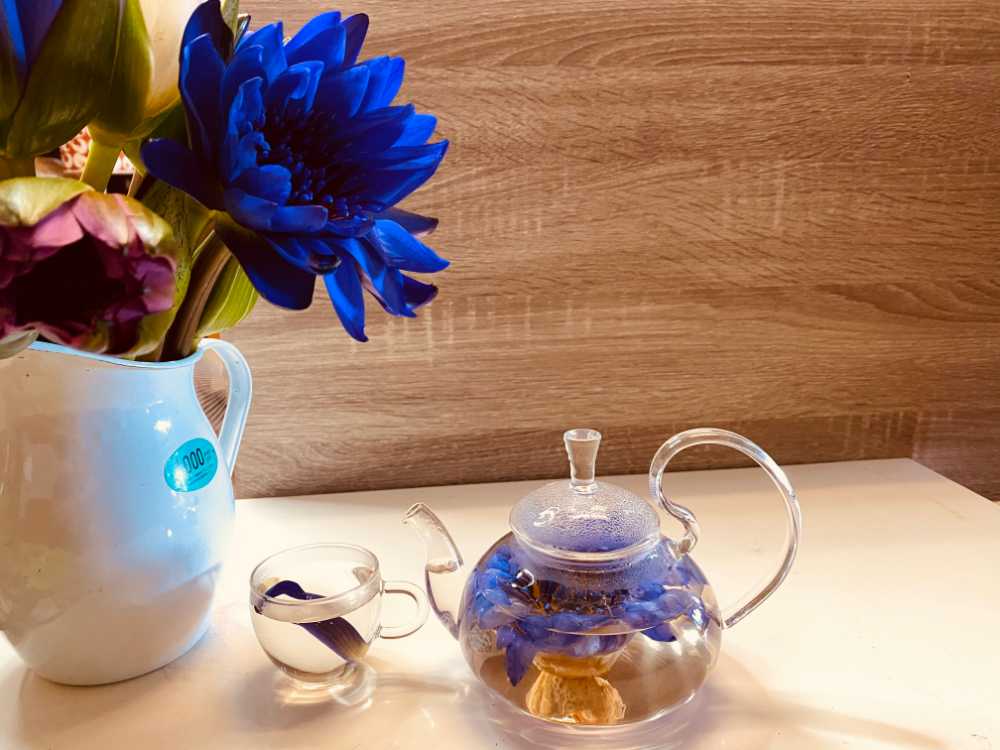
Effects of Blue Lotus
Blue lotus has several effects on the body. Those who experience blue lotus effects experience it as calming and euphoric sensations. The overall experience is said to be very serene.
We answered “What is blue lotus?” But what can blue lotus do for you? Here are some of the positive ways blue lotus affects you.
- Promotes Relaxation. People tend to feel calmer after taking blue lotus. It is an effective sleep support solution. Blue lotus can also help to relieve symptoms associated with stress and anxiousness.
- Enhances Wellness. Blue water lily contains antioxidants that may support overall health and well-being. They can help to protect the body from premature aging and disease.
- Elevates Mood. The nuciferine and apomorphine in blue lotus have mood-improving effects. They balance serotonin and dopamine to put you in a better state of mind.
- Euphoric Effects. This fascinating plant also causes euphoric sensations. The compounds interact with your nervous system to produce mild euphoria. Stronger doses may cause hallucinations and lucid dreaming. Go slowly to determine how it will affect you before proceeding.
Take With Safety
Although blue lotus is mostly beneficial, it can cause the following side effects if overconsumed or consumed irresponsibly. Potential blue lotus effects may include the following:
- Dry mouth
- Nausea and vomiting
- Confusion
- Dizziness
- Drowsiness
Responsible dosing is key. It’s best to talk to a healthcare provider before using blue lotus. They will let you know if the flower is likely to cause adverse health effects. They will also guide you on proper dosing.
Start slow with blue lotus star-shaped flowers. Take a low dose to determine how it will affect you. Increase your dose gradually as needed.
Final Thoughts – What Is Blue Lotus? [History, Benefits, Uses & More]
What is blue lotus? It’s a link to ancient wellness. These beautiful blue booms were staples of Ancient Egypt and other cultures around the world. They played a major role in Eastern medicine and are now experiencing a resurgence with modern audiences due to their holistic wellness properties.
Many people use blue lotus for its ability to improve mood and promote wellness and relaxation. The flower itself produces unique euphoric experiences. However, how you consume and how often you take it plays a role in its potential effects. However, it’s important to proceed with caution. Talk to a medical professional to ensure you dose safely. Small, controlled dosing is the best way to start your blue lotus experience.
Budpop’s Blue Lotus Dream Gummies are the perfect way for you to experience the benefits of this ancient, time-tested wellness solution! Head over to our shop and get yourself a bottle today! Good luck using blue lotus to achieve your wellness goals!
FAQs – What Is Blue Lotus?
Is Blue Lotus Legal?
Blue lotus is legal in the United States. However, it is not FDA-approved, and there are no regulations regarding its potency and purity.
Where Does Blue Lotus Extract Come From?
Blue lotus extract comes directly from the blue lotus flower. Safe and clean extraction methods remove beneficial blue lotus compounds into a potent full-spectrum extract. Blue lotus is mainly found in Egypt, parts of Africa, and certain regions of Asia. It’s commonly grown in shallow waters.
How Often Should I Take Blue Lotus?
There are no clear guidelines regarding how often you should take blue lotus. It’s best to start slow and see how it affects you. Start by taking it occasionally and increase your dosage frequency as needed. If you’re new to blue lotus, do not exceed doses of 5 grams in one sitting.
Are There Any Side Effects of Blue Lotus?
Yes, there are side effects of blue louts. They typically occur with overconsumption or irresponsible consumption. Side effects of blue lotus can cause mild, temporary effects like nausea, dizziness, vomiting, drowsiness, and confusion. Start with low doses to ensure you don’t encounter these side effects. If you do, consider lowering your doses or eliminating blue lotus consumption.
What Does Blue Lotus Do to Our Body?
Due to its compound content, blue lotus has various effects on the body. Its antioxidants enhance wellness. Blue lotus flower alkaloids produce euphoric effects, may elevate mood, and may provide other health benefits. However, due to tolerance levels, metabolism, and other factors, it may produce different effects in different people. Dose carefully to determine how it will affect you.



